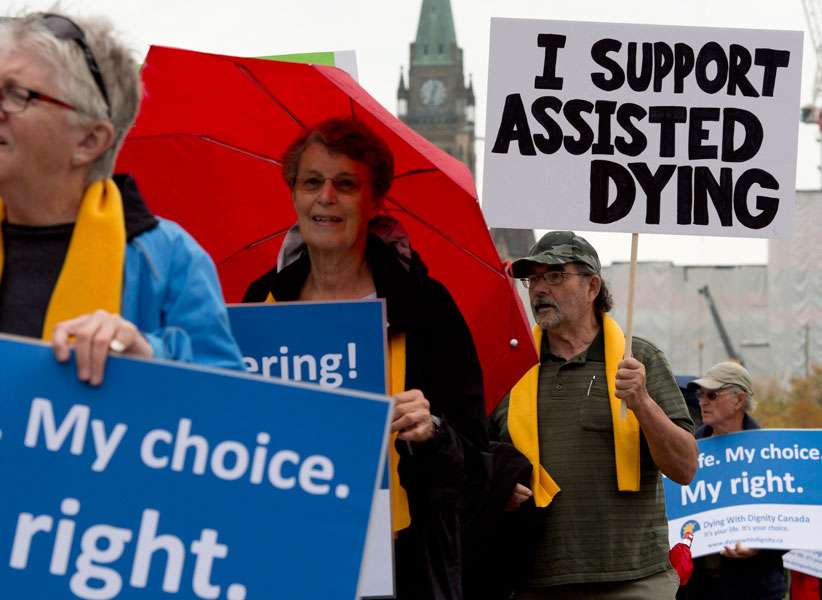Doctors react to the physician-assisted death ruling
To some groups it was ‘a sad day for health care’. For others, ‘everything we could have hoped for’.
The Supreme Court of Canada will rule Friday morning on whether mentally competent but suffering, terminally ill patients have a right to a medically assisted death. The Supreme Court is seen in Ottawa on Friday, Feb. 6, 2015. Sean Kilpatrick/CP
Share

The decision by the Supreme Court of Canada, striking down the ban on providing a doctor-assisted death to mentally competent but suffering, “irremediable” patients, is being met with a mix of emotions among doctors and medical groups across the country.
“It’s everything we could have hoped for,” said Dr. James Downar, a critical care and palliative care physician at Toronto’s University Health Network, and a member of the physician advisory council of Dying with Dignity Canada, which supports both assisted death and physician-assisted death. “It’s such a strong ruling. The judges were unanimous in every aspect of their decision and their logic and reasoning (and) agreed on every word and every sentence in the ruling’s 147 paragraphs,” said Dr. Downar.
He urged the federal government to use what he called “the clear instructions contained in the ruling” to begin work on drafting a new law. “The provinces and the regulatory bodies also need to come up with a framework (and) find answers to questions and issues like conscientious objections,” said Dr. Downar. “They also need to figure out how they will provide access to both physician-assisted death and comprehensive palliative care.”
For her part, the president of the Montreal-based Physicians’ Alliance against Euthanasia, which was founded in 2012 by 24 Quebec doctors in response to the report of the Quebec government’s select committee on Dying with Dignity, said she was unhappy with the high court’s ruling. “It’s a sad day for health care in Canada,” said Dr. Catherine Ferrier, who works in the geriatric outpatient clinic at the McGill University Health Centre. “The notion that vulnerable people who reach the end of life can be expected to lucidly say ‘I want to be dead’ is nonsense. Autonomy in a vacuum doesn’t exist.”
According to Dr. Ferrier, many elderly people who are sick are faced with serious personal and material constraints and difficulties, leaving many feeling guilty and embarrassed at being a burden on family members.
“Any law that allows doctors to intentionally end the lives of their patients is contrary to the goals of medicine and the good of our patients, especially the most vulnerable (and) those who can’t speak for themselves,” she said. “But the pressure from the pro-euthanasia lobby is very strong and, in light of today’s decision, obviously very successful.”
In the minutes that followed the Supreme Court’s ruling, prominent B.C. physician Dr. Granger Avery, who is running to be Canadian Medical Association (CMA) president elect, sent several tweets announcing the decision and his hopes for what will come next. “Supreme Court of Canada unanimously strikes down the ban on providing a doctor-assisted death. Revise laws required,” wrote Dr. Granger, a clinical professor with UBC’s department of family practice and chair of the rural issues committee with Doctors of BC. “Will be very interesting to see what law replaces the ban. Hope they consult physicians for input.”
For its part, the College of Family Physicians of Canada issued a statement after the ruling in which CFPC president Dr. Garey Mazowita is quoted as saying the organization “is aware of the public positions on this issue, and we believe that it is important for patients to have these discussions with their family doctor. “The CFPC strongly supports a health care system that includes strong resources for palliative care and ensures that we support the dignity and independence of every patient.”
The missive also stated that the college is “preparing a paper that will support our members’ understanding of the dimensions of physician-assisted suicide and euthanasia.” The college last issued a position statement on issues related to end of life care in March 2012. That paper identified and explained several key issues related to end of life care, including fundamental goals of medicine, euthanasia, assisted death, the safety and efficacy of opioid analgesics and sedatives in advanced disease, suffering as the cause of a request to hasten death, and patients’ and physician’s rights and responsibilities. The paper is due to be reviewed next month.
In an interview with Maclean’s CMA president Dr. Chris Simpson said at a series of town halls the CMA did last year there was no “consensus” among doctors on this issue “but the very powerful stories on both sides of the debate had everybody step back and reflect, and say, ‘There can’t be a one-size-fits-all. We have to have the ability to fit everybody’s legitimate concerns and aspirations here.’”
As well Dr. Simpson noted the CMA did “pass a policy at our last general council that said we would support our members, doctors and their patients, who chose to pursue medical aid in dying, should the legal environment change. And of course, today, it did.”
Dr. Simpson also said there was nothing in the language of the ruling to suggest individual physicians would be compelled to participate. “So I think, over the next 12 months—which is the time frame everybody has to think about this and get something robust in place—we’ll need to balance the need to provide this service to the small number of patients who need it and are eligible for it and protecting physicians from being coerced if they don’t want to participate in this,” he said.